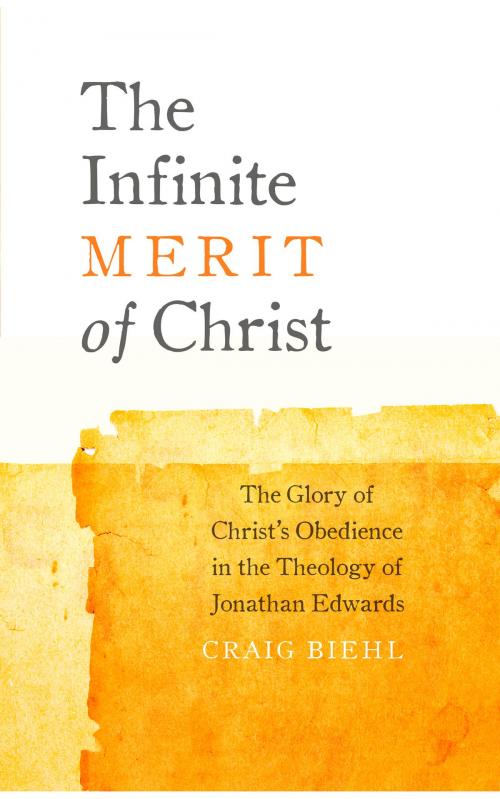The Infinite Merit of Christ
The Glory of Christ's Obedience in the Theology of Jonathan Edwards
Nonfiction, Religion & Spirituality, Theology, Christianity| Author: | Craig Biehl | ISBN: | 9780990666660 |
| Publisher: | Pilgrim's Rock Press | Publication: | September 15, 2014 |
| Imprint: | Language: | English |
| Author: | Craig Biehl |
| ISBN: | 9780990666660 |
| Publisher: | Pilgrim's Rock Press |
| Publication: | September 15, 2014 |
| Imprint: | |
| Language: | English |
God is infinitely excellent, and that excellence is most profoundly displayed in the person and saving work of Jesus Christ. The heart of Edwards’ theology radiates the glory of God as displayed in Christ’s saving of unworthy sinners through perfect obedience to God’s unchanging rule of righteousness. The whole of Edwards’ theology stands on the beauty and redemptive work of Christ as revealing and communicating the marvelous perfections of the Trinity. Salvation of a single soul apart from perfect conformity to God’s rule of righteousness would render God unrighteous and abolish His ultimate purpose to display and communicate His glory. Indeed, God could not be God. Revisionist interpretations of Edwards’ soteriology as inclusive or Catholic, therefore, are untenable without an overthrow and rewrite of the entirety of Edwards’ theology. Chapter One examines the ultimate Trinitarian purpose to display and communicate His glory through the Father’s gift of a bride for His Son, and the Son’s purchase of His bride by His perfect obedience to God’s rule of righteousness. Indeed, all of creation serves as the stage of God’s purpose and plan in Christ, leading to the ultimate goal of the saints’ happiness in heaven as they enjoy the infinite blessings of Christ’s exaltation and glory. Chapter Two probes the pre-temporal Trinitarian and covenantal foundation of Christ’s obedience, highlighting the Father’s love in His purpose to save a people, and the Son’s love in freely undertaking to accomplish it. Initiated by the Father, and mutually accepted by Christ and the Father, the terms of the Covenant of Redemption provide for the purchase of Christ’s bride without injury to God’s perfections, most notably His righteous justice. And as Christ voluntarily accepted the terms of the covenant, the entirety of Christ’s saving work earned infinite merit for those He represented and purchased. Chapter Three examines the command to Adam as representative of God’s unchanging rule of righteousness that requires perfect obedience for the obtaining of eternal life. All of God’s commands are comprehended in this one great and unchanging rule of righteousness, as it reflects the very character of God. Chapter Four probes the absolute need for Christ’s perfect obedience in light of Adam’s sin as the representative of mankind, the immutability of God’s righteousness and law despite Adam’s sin, the infinite guilt of sin and the need of an infinite remedy, God’s requirement of a perfect positive righteousness and exclusion of an imperfect righteousness for justification, Christ’s perfect satisfaction of God’s unalterable rule of righteousness, and God’s nature as a righteous judge to uphold eternally His rule of perfect righteousness. Considered apart from Christ, the best of our works are sinful and unable to satisfy God’s requirement of righteousness. And as a righteous judge, God can never justify an imperfect righteousness. Chapter Five examines the basis and infinite extent of the merit Christ earned by His obedience, the obedience comprising the righteousness by which sinners are justified, the free act of Christ giving His life as His greatest meritorious act, the propitiatory and meritorious nature of all of Christ’s incarnate acts, and the rewards earned on behalf of the elect. In these, Christ accomplished God’s ultimate purpose to display and communicate His glory, consummated in heaven in the marriage of Christ to His bride, to the enjoyment of God’s glory forever.
God is infinitely excellent, and that excellence is most profoundly displayed in the person and saving work of Jesus Christ. The heart of Edwards’ theology radiates the glory of God as displayed in Christ’s saving of unworthy sinners through perfect obedience to God’s unchanging rule of righteousness. The whole of Edwards’ theology stands on the beauty and redemptive work of Christ as revealing and communicating the marvelous perfections of the Trinity. Salvation of a single soul apart from perfect conformity to God’s rule of righteousness would render God unrighteous and abolish His ultimate purpose to display and communicate His glory. Indeed, God could not be God. Revisionist interpretations of Edwards’ soteriology as inclusive or Catholic, therefore, are untenable without an overthrow and rewrite of the entirety of Edwards’ theology. Chapter One examines the ultimate Trinitarian purpose to display and communicate His glory through the Father’s gift of a bride for His Son, and the Son’s purchase of His bride by His perfect obedience to God’s rule of righteousness. Indeed, all of creation serves as the stage of God’s purpose and plan in Christ, leading to the ultimate goal of the saints’ happiness in heaven as they enjoy the infinite blessings of Christ’s exaltation and glory. Chapter Two probes the pre-temporal Trinitarian and covenantal foundation of Christ’s obedience, highlighting the Father’s love in His purpose to save a people, and the Son’s love in freely undertaking to accomplish it. Initiated by the Father, and mutually accepted by Christ and the Father, the terms of the Covenant of Redemption provide for the purchase of Christ’s bride without injury to God’s perfections, most notably His righteous justice. And as Christ voluntarily accepted the terms of the covenant, the entirety of Christ’s saving work earned infinite merit for those He represented and purchased. Chapter Three examines the command to Adam as representative of God’s unchanging rule of righteousness that requires perfect obedience for the obtaining of eternal life. All of God’s commands are comprehended in this one great and unchanging rule of righteousness, as it reflects the very character of God. Chapter Four probes the absolute need for Christ’s perfect obedience in light of Adam’s sin as the representative of mankind, the immutability of God’s righteousness and law despite Adam’s sin, the infinite guilt of sin and the need of an infinite remedy, God’s requirement of a perfect positive righteousness and exclusion of an imperfect righteousness for justification, Christ’s perfect satisfaction of God’s unalterable rule of righteousness, and God’s nature as a righteous judge to uphold eternally His rule of perfect righteousness. Considered apart from Christ, the best of our works are sinful and unable to satisfy God’s requirement of righteousness. And as a righteous judge, God can never justify an imperfect righteousness. Chapter Five examines the basis and infinite extent of the merit Christ earned by His obedience, the obedience comprising the righteousness by which sinners are justified, the free act of Christ giving His life as His greatest meritorious act, the propitiatory and meritorious nature of all of Christ’s incarnate acts, and the rewards earned on behalf of the elect. In these, Christ accomplished God’s ultimate purpose to display and communicate His glory, consummated in heaven in the marriage of Christ to His bride, to the enjoyment of God’s glory forever.















